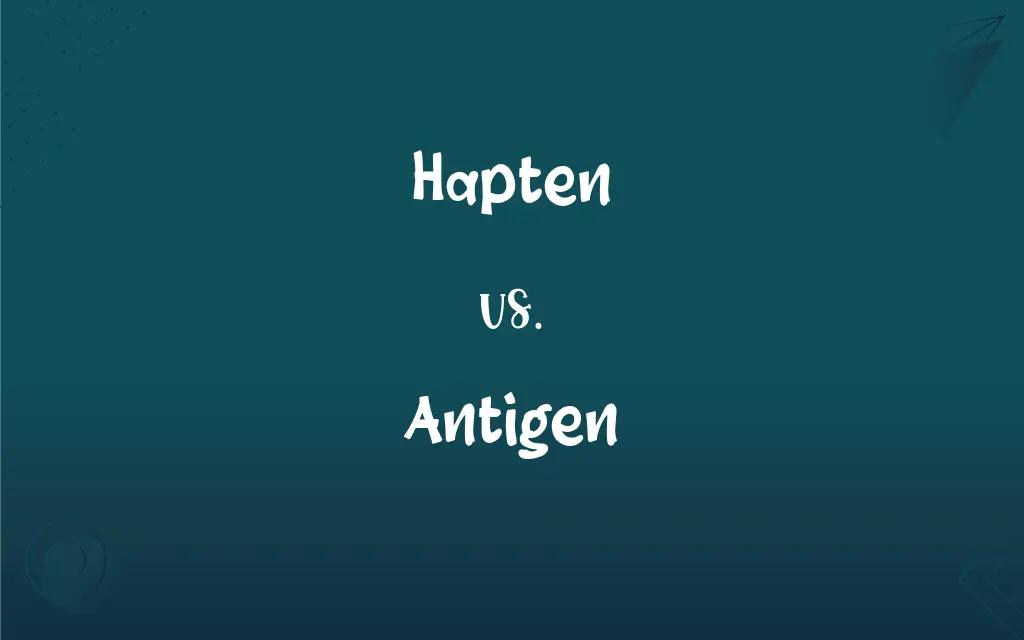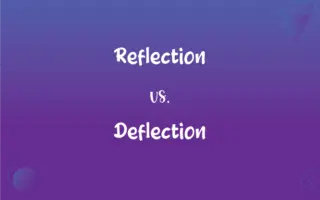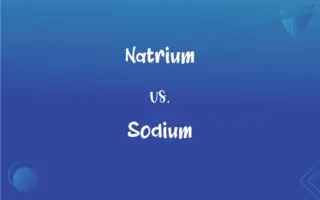Hapten vs. Antigen: What's the Difference?
Edited by Harlon Moss || By Janet White || Published on January 5, 2024
A hapten is a small molecule that elicits an immune response only when attached to a larger carrier, whereas an antigen is any substance that can provoke an immune response.

Key Differences
Haptens are small molecules that cannot by themselves stimulate the immune system; they need to bind to a larger carrier protein or molecule. Antigens are substances, either large or small, that are recognized by the immune system and can trigger an immune response.
When a hapten binds to a carrier protein, the complex can be recognized as an antigen, leading to an immune response. In contrast, antigens can independently initiate immune responses without needing to attach to other molecules.
Common examples of haptens include small drugs or chemical compounds, which alone are not immunogenic. Antigens are diverse and include proteins, polysaccharides, and even entire organisms like bacteria and viruses.
The concept of a hapten is central in understanding drug-induced allergies, where the drug (hapten) binds to body proteins. Antigens are fundamental in vaccine development, where specific antigens from pathogens are used to elicit immunity.
In research, haptens are used in the study of specific immune responses and antibody production. Antigens, being more diverse, are studied in a wid
ADVERTISEMENT
Comparison Chart
Size and Immune Response
Small, not immunogenic alone
Can be large or small, intrinsically immunogenic
Need for Carrier
Requires a carrier protein for immune response
No carrier needed, independently immunogenic
Examples
Drugs, chemicals
Proteins, bacteria, viruses
Role in Allergies
Central in drug-induced allergies
Involved in various allergic reactions
Research Applications
Antibody specificity, immune response studies
Vaccine development, disease studies, diagnostics
ADVERTISEMENT
Hapten and Antigen Definitions
Hapten
Not independently immunogenic.
A hapten alone does not trigger an immune response without a carrier.
Antigen
Can be a protein, polysaccharide, or even a pathogen.
Bacterial cell wall components are antigens that stimulate immunity.
Hapten
A small molecule that needs a carrier to elicit an immune response.
Penicillin acts as a hapten by binding to serum proteins.
Antigen
A substance that triggers an immune response.
The flu virus contains antigens that are recognized by the immune system.
Hapten
Commonly found in small drugs or chemicals.
Many small therapeutic agents can act as haptens.
Antigen
Central in the development of vaccines.
Vaccines contain specific antigens to elicit protective immunity.
Hapten
Binds to larger molecules to become immunogenic.
Once attached to a protein, a hapten can induce antibody formation.
Antigen
Involved in various immune responses and allergies.
Pollen contains antigens that can cause allergic reactions.
Hapten
Important in studying drug-induced allergies.
Researchers study haptens to understand allergic reactions to medications.
Antigen
Independently recognized by the immune system.
Antigens on the surface of pathogens are targeted by antibodies.
Hapten
A small molecule that reacts with a specific antibody but does not induce an immune response unless bound to a larger molecule, usually a protein.
Antigen
A molecule that is capable of binding to an antibody or to an antigen receptor on a T cell, especially one that induces an immune response. An antigen is usually a foreign substance, such as a toxin or a component of a virus, bacterium, or parasite.
Hapten
(immunology) Any small molecule that can elicit an immune response only when attached to a large carrier such as a protein.
Antigen
(immunology) A substance that induces an immune response, usually foreign.
Antigen
Any substance (as a toxin or enzyme) that stimulates the production of antibodies
FAQs
Is a hapten always a drug?
Not always, it can be any small molecule.
What is a hapten?
A small molecule that becomes immunogenic when attached to a carrier.
Can haptens cause allergies?
Yes, especially when they bind to body proteins.
How do antigens trigger immune responses?
They are recognized by the immune system, leading to antibody production.
What types of substances are antigens?
Proteins, polysaccharides, bacteria, viruses, etc.
Are antigens always harmful?
Not necessarily; they can also be used for protective immunity.
What makes a molecule a hapten?
Its small size and inability to elicit an immune response alone.
Are all antigens pathogens?
No, they can be any substance that the immune system recognizes.
Do haptens need a carrier to be immunogenic?
Yes, they require a carrier protein or molecule.
Are haptens involved in drug reactions?
Yes, particularly in drug-induced allergies.
Can a hapten alone trigger an immune response?
No, it needs to be attached to a larger molecule.
How do antibodies recognize antigens?
They bind to specific sites on the antigen.
Can a person be naturally immune to certain antigens?
Yes, through innate immunity or previous exposure.
How are haptens used in research?
In studies of antibody production and specificity.
What are examples of haptens in everyday life?
Certain cosmetics and perfumes contain haptens.
Can antigens be used in vaccines?
Yes, they are key components in vaccines.
Do haptens play a role in vaccinations?
Not directly, but they help in understanding immune mechanisms.
Are antigens part of the innate or adaptive immune system?
They are primarily recognized by the adaptive immune system.
Can antigens be synthetic?
Yes, synthetic antigens are used in research and vaccines.
How do antigens differ from pathogens?
Antigens are specific molecules, while pathogens are organisms that can contain many antigens.
About Author
Written by
Janet WhiteJanet White has been an esteemed writer and blogger for Difference Wiki. Holding a Master's degree in Science and Medical Journalism from the prestigious Boston University, she has consistently demonstrated her expertise and passion for her field. When she's not immersed in her work, Janet relishes her time exercising, delving into a good book, and cherishing moments with friends and family.
Edited by
Harlon MossHarlon is a seasoned quality moderator and accomplished content writer for Difference Wiki. An alumnus of the prestigious University of California, he earned his degree in Computer Science. Leveraging his academic background, Harlon brings a meticulous and informed perspective to his work, ensuring content accuracy and excellence.




































































